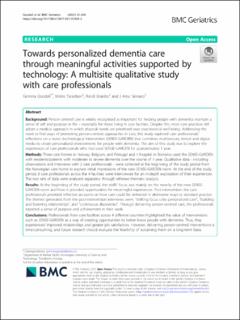| dc.description.abstract | Background: Person-centred care is widely recognised as important for helping people with dementia maintain a sense of self and purpose in life – especially for those living in care facilities. Despite this, most care practices still adopt a medical approach in which physical needs are prioritized over psychosocial well-being. Addressing the need to find ways of promoting person-centred approaches in care, this study explored care professionals’ reflections on a novel, technological intervention (SENSE-GARDEN) that combines multisensory stimuli and digital media to create personalized environments for people with dementia. The aim of this study was to explore the experiences of care professionals who had used SENSE-GARDEN for approximately 1 year. Methods: Three care homes in Norway, Belgium, and Portugal and 1 hospital in Romania used the SENSE-GARDEN with residents/patients with moderate to severe dementia over the course of 1 year. Qualitative data - including observations and interviews with 2 care professionals - were collected at the beginning of the study period from the Norwegian care home to explore initial impressions of the new SENSE-GARDEN room. At the end of the study period, 8 care professionals across the 4 facilities were interviewed for an in-depth exploration of their experiences. The two sets of data were analysed separately through reflexive thematic analysis. Results: At the beginning of the study period, the staffs’ focus was mainly on the novelty of the new SENSEGARDEN room and how it provided opportunities for meaningful experiences. Post-intervention, the care professionals provided reflective accounts on how care could be delivered in alternative ways to standard practice. The themes generated from the post-intervention interviews were: “shifting focus onto personalized care”, “building and fostering relationships”, and “continuous discoveries”. Through delivering person-centred care, the professionals reported a sense of purpose and achievement in their work. Conclusions: Professionals from care facilities across 4 different countries highlighted the value of interventions such as SENSE-GARDEN as a way of creating opportunities to better know people with dementia. Thus, they experienced improved relationships and greater job satisfaction. However, delivering person-centred interventions is time-consuming, and future research should evaluate the feasibility of sustaining them on a long-term basis | en_US |

